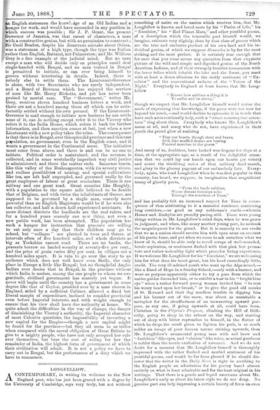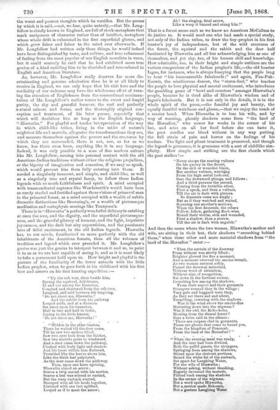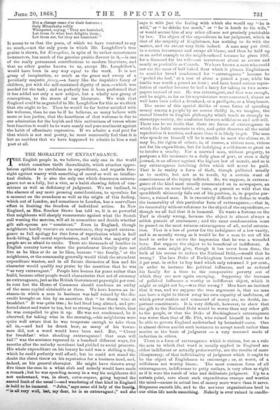LONGFELLOW. A CONTEMPORARY, in writing its welcome to the New
LI England poet, who has just been graced with a degree by the University of Cambridge, says very truly, but not without something of satire on the nation which receives him, that Mr. Longfellow is known and loved more by his "Psalm of Life," his "Excelsior," his "Red Planet Man," and other youthful poems, of a description which the venerable poet himself would, we imagine, estimate very slightly, than by that class of poems which are the true and exclusive product of his own land and his in- dividual genius, of which we suppose Hiawatha is by far the most striking and the most perfect. It is certainly true enough that for once that you come across any quotation from that exquisite picture of the wild and simple and dignified genius of the North American Indians, and of their strangely familiar communion with the lower tribes which inhabit the lake and the forest, you meet with at least a dozen allusions to the sickly sentiment of " Ex- celsior " and the conventional sadness of the "Voices of the Night." Everybody in England at least knows that Mr. Long- fellow "Knows bow sublime a thing it is
To suffer and be strong,"
though we suspect that Mr. Longfellow himself would revise the mode of expressing that knowledge, if the poem were not now far beyond his reach,—and would decline to epitomize it in words that have such a conventionally holy, such a "sweet consumptive seven- teen" ring about them. Everybody who knows Mr. Longfellow's name at all, and many who do not, have experienced in their youth the proud glow of realizing "That our hearts, though stout and brave, Still, like muffled drums are beating Funeral marches to the grave."
And many of us, doubtless, have looked woe-begone for days at a time, at the appropriate age, as a result of the delightful sensa- tion that we could lay our hands upon our hearts (or wrists) and count the throbbing notes of that military dead-march, and glory in the gloomy pageant of our melancholy fate. Every- body, again, who read Longfellow when he was first popular in this country, has heard, we suppose, in imagination that magnificent tramp of ghostly poets, "From the bards sublime, Whose distant footsteps echo Through the corridors of Time," and has probably felt an increased respect for Time in conse- quence of thus attributing to it a manorial residence containing long corridors,—as good as any nobleman's castle—wherein Homer and .Eschylus are proudly pacing still. These were young things written in Mr. Longfellow's salad days, when he was green in judgment, and when, like many another young poet, he mistook the magniloquent for the grand. But it is scarcely to our credit that we as a nation should receive him with open arms on account of his poetic fame, and yet when we come to ask ourselves what we know of it, should be able only to recall scraps of well-rounded, heroic aspiration, or sentiment flushed with that pink but prema- ture and rather unhealthy light which precedes living experience. If we welcome Mr. Longfellow for his "Excelsior," we are welcoming him for what does his heart great, but his head exceedingly little, credit. The very ill-advised youth who went up the Alps armed,— like a Band of Hope in a Sunday School,—only with a banner, and went on purpose apparently either to try a pass from which the native guides dissuaded him, or to exhibit a tear in his "bright blue eye" when a rather forward young woman invited him 't to rest his weary head upon her breast," or to give the good old monks of St. Bernard and their dog needless trouble in digging him and his banner out of the snow, was about as unsuitable a metaphor for the steadfastness of an unwavering upward pur- pose, as any one, if going upwards at all, could have been. Christian in the Pilgrim's Progress, climbing the Hill of Diffi- culty, going to sleep in the arbour on the way, and starting out of sleep with bitter reproaches to himself, in the flutter of which he drops the scroll given to lighten his path, is as much nobler an image of poor human nature striving upwards, than Mr. Longfellow's ornamental young man with sad brow and " faulchion"-like eyes, and "clarion"-like voice, as actual goodness is nobler than the hectic exaltation of romance. And we do not doubt for a moment that Mr. Longfellow himself is thoroughly impressed with the rather flushed and morbid sentiment of his youthful poems, and would be far from pleased if he should dis- cover that the writer in the Daily News is right in ascribing to the English people an admiration for his poetry based almost entirely on what is least admirable and far the least original in his writings. That there is a gentle and liquid sweetness about Mr. Longfellow's early as about his latest style we do not deny. No genuine poet can help impressing a certain beauty of form on even
the worst and poorest thoughts which he versifies. But the poems by which it is said,—not, we fear, quite untruly,—that Mr. Long- fellow is chiefly known in England, are full of stock-metaphors that mark unripeness of character rather than of intellect, metaphors whose whole drift is exhausted in the first superficial glance, and which grow falser and falser to the mind ever afterwards. If Mr. Longfellow had written only these things, he would indeed have been distinguished by taste, and culture, and true refinement of feeling from the most popular of our English moralists in verse, but it could scarcely be said that he had exhibited more true genius of a kind entitling him to be cherished and remembered in English and American literature.
As, however, Mr. Longfellow really deserves far more dis- criminating and genuine admiration than he is at all likely to receive in England, we can only hope that his visit here and the cordiality of our welcome may have the wholesome effect of turn- ing the attention of Englishmen from the conventional sentimen- talism of Mr. Longfellow's earlier verses to the sweet and limpid purity, the shy and graceful humour, the cool and perfectly n atural colours and forms, and the thoroughly original con- ception and treatment, of his later poems, especially that which will doubtless live as long as the English language, "Hiawatha." For playful and tender interpretation of the way in which child-like tribes, living in the midst of nature's mightiest life and marvels, allegorize the transformations they see, and measure themselves against the powers and the creatures by which they are surrounded, there is not, nor, as far as we know, has there even been, anything like it in any language. Indeed, it was only possible to a man of fine modern culture like Mr. Longfellow, coming into personal contact with the old American-Indian traditions without either the religious prejudices, or the bigotry of imagination and sensation, if we may so speak, which would prevent him from fully entering into them. It needed a singularly innocent, and simple, and child-like, as well AB a singularly true and crystal fancy, to follow these Indian legends with so much faithfulness and spirit. A mind occupied with transcendental raptures like Wordsworth's would have been as surely steeled and fortified against these visions of primeval man in the primeval forest, as a mind occupied with a wealth of subtle dramatic distinctions like Browning's, or a wealth of picturesque meditation and metaphysic musings like Tennyson's.
There is in " Hiawatha" a perfectly wonderful delicacy in catching at once the awe, and the dignity, and the superficial picturesque- ness, and the graceful pliancy of humour, and the light, impulsive joyousness, and the dark but airy superstition, and the passionate love of fitful excitement, in the old Indian legends. Hiawatha has, to our minds, familiarized us more perfectly with the old inhabitants of the American forests, than all the volumes of tradition and legend which ever preceded it. Mr. Longfellow's genius was just the genius to interpret between it and us, to paint it to us as we are best capable of seeing it, and as it is most likely to take a permanent hold upon us. How bright and playful is the picture of the familiarity of the lower animals with the little Indian prophet, when he goes forth in his childhood with his first bow and arrows on his first hunting expedition :—
"Up the oak tree, close beside him,
Sprang the squirrel, Adjidaumo, In and out among the branches, Coughed and chattered from the oak-tree, Laughed, and said between his laughing, Do not shoot me, Hiawatha!'
And the rabbit from his pathway
Leaped aside, and at a distance Sat erect upon his haunches, Half in fear and half in frolic, Saying to the little hunter, 'Do not shoot me, Hiawatha!'
"Hidden in the alder-bushes, There he waited till the deer came, Till he saw two antlers lifted, Saw two eyes look from the thicket, Saw two nostrils point to windward, And a deer came down the pathway, Flecked with leafy light and shadow. And his heart within him fluttered, Trembled like the leaves above him, Like the birch leaf palpitated, As the deer came down the pathway.
Then, upon one knee uprising, Hiawatha aimed an arrow : Scarce a twig moved with his motion, Scarce a leaf was stirred or rustled, But the wary roebuck started, Stamped with all his hoofs together, Listened with one foot uplifted, Leaped as if to meet the arrow;
Ah! the singing, fatal arrow, Like a wasp it buzzed and stung him!"
That is a forest scene such as we know no American McCallum to do justice to. It would need one who had made a special study, not only of the Indian tribes, to draw the boy-prophet in his first hunter's joy of independence, but of the wild creatures of the forest, the squirrel and the rabbit and the deer half fascinated by Hiawatha and all but acknowledging him as one of themselves, and yet shy, too, of his human skill and knowledge. How admirable, too, in their bright and simple outlines are the various companions of the Indian prophet's life,—the old boaster Iagoo, for instance, who is always fancying that the people long to hear "his immeasurable falsehoods ;" and again, Pau-Puk- Keewis, the mischievous dancer, the "storm-fool," who teaches the people to love physical and mental excitement, who introduces the gambling game of "bowl and counters" amongst Hiawatha's people, because he is tired alike of Hiawatha's wisdom and of lagoo's falsehoods. But it is not only in the details, it is in the whole spirit of the poem,—the fanciful joy and beauty, the equally fanciful weirdness and gloom,—that we enjoy the touch of a master hand. When Hiawatha is to lose his wife, and by way of warning, ghostly shadows come from "the land of the Hereafter," who cower for weeks in the corner of his hut, and seize on all her food before she can taste it, the poet curdles our blood without in any way putting the full strain of pain and horror on the feelings of his readers. The light and pliant treatment is preserved, and though the legend is gruesome, it is gruesome with a sort of childlike sim- plicity. How simple and striking are the first chords which the poet strikes !-
"Never stoops the soaring vulture
On his quarry in the desert, On the sick or wounded bison, But another vulture, watching From his high aerial look-out,
Sees the downward plunge, and followa;
And a third pursues the second, Coming from the invisible ether, First a speck, and then a vulture, Till the air is dark with pinions.
So disasters come not singly ; But as if they watched and waited, Scanning one suiother's motions, When the first descends, the others Follow, follow, gathering flock-wise, Round their victim, sick and wounded, First a shadow, then a sorrow, Till the air is dark with anguish."
And then the scene where the two women, Hiawatha's mother and wife, are sitting in their hut, their shadows "crouching behind them," when these other and more material shadows from "the land of the Hereafter" enter :—
"Then the curtain of the doorway
From without was slowly lifted ; Brighter glowed the fire a moment, And a moment swerved the smoke-wreath, As two women entered softly, Passed the doorway uninvited, Without word of salutation, Without sign of recognition, Sat down in the farthest corner, Crouching low among the shadows.
From their aspect and their garments Strangers seemed they in the village ; Very pale and haggard were they, As they sat there sad and silent, Trembling, cowering with the shadows.
Was it the wind above the smoke-fine Muttering down into the wigwam ?
Was it the owl, the Koko-koho, Hooting from the dismal forest ?
Sure a voice said in the silence : These are corpses clad in garments, These are ghosts that come to haunt you, From the kingdom of Ponemah, From the land of the Hereafter!"
"When the evening meal was ready, And the deer had been divided, Both the pallid guests, the strangers, Springing from among the shadows, Seized upon the choicest portions, Seized the white fat of the .roebuck, Set apart for Laughing Water, For the wife of Hiawatha ; Without asking, without thanking, Eagerly devoured the morsels, Flitted back among the shadows In the corner of the wigwam. Not a word spake Hiawatha, Not a.motion made Nokomis, Not a gesture Laughing Water Not a change came o'er their features ; Only Minnehaha softly
Whispered, saying, 'They are famished, Let them do what best delights them ; Lot them eat, for they are famished."
It seems to us that the poem, of which we have ventured to say so much,—not the only poem in which Mr. Longfellow's true genius is shown, for Evangeline, in spite of its rather monotonous hexameters, has much of the genuine prairie-flavour in it,—is one of the really permanent contributions to modern literature, and that no other genius known to us, except Mr. Longfellow's, would have been in any way equal to the work. It is not grasp of imagination, so much as the grace and sweep of a peculiarly majestic fancy,—a fancy like the impulsive fancy of -children, yet with the self-contained dignity of men,—which was needed for the task ; and so perfectly has it been performed that it has added not only a new subject, but a wholly new group of conceptions, to the stores of our literature. We wish that England could be as grateful to Mr. Longfellow for this as we think -that she ought to be. Then he would be far better satisfied with his welcome, than he can be if he believes, as many believe with more or less justice, that the heartiness of that welcome is due to our admiration for the boyish and thin enthusiasm of verses whose best function it would be to warn manly and pure sentiment against the habit of effeminate expression. If we admire a real poet for that which is not real poetry, he must necessarily feel that it is but an accident that we have happened to admire in him a real poet at all.




































 Previous page
Previous page